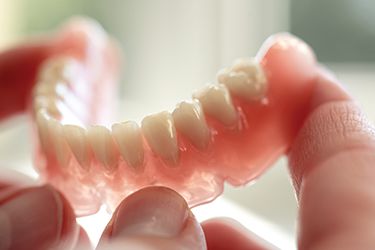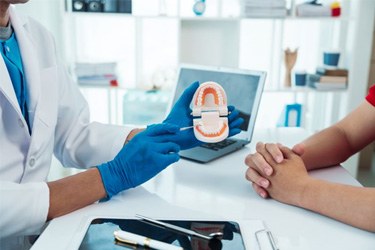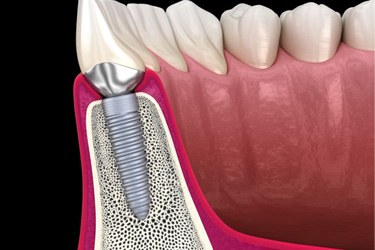Dentures – Schenectady, NY
Beautiful & Reliable Tooth Replacement
 If you have lost all or most of your teeth, Dr. Page and our Schenectady dental team are ready to assess your case and design a treatment plan to help you rebuild your smile. We may recommend that you receive dentures. We custom design each prosthetic so it provides beautiful, reliable tooth replacement and enables you to eat a wide variety of foods. Read this page to learn more about dentures, and contact us when you are ready to book your consultation.
If you have lost all or most of your teeth, Dr. Page and our Schenectady dental team are ready to assess your case and design a treatment plan to help you rebuild your smile. We may recommend that you receive dentures. We custom design each prosthetic so it provides beautiful, reliable tooth replacement and enables you to eat a wide variety of foods. Read this page to learn more about dentures, and contact us when you are ready to book your consultation.
Why Choose Capital Smiles for Dentures?
- Custom Designed for Each Patient
- Highly Skilled & Empathetic Team
- State-of-the-Art Technology
Who Is a Good Candidate for Dentures?

Dentures are a suitable option for virtually anyone who has suffered extensive tooth loss. They have the potential to restore a degree of chewing power, enhance your confidence, and more.
Dr. Page will examine your mouth to determine for sure if dentures are right for you. If you have only lost a few teeth, a different type of tooth replacement may be a better option. If you have active gum disease or other significant oral health conditions, you may need to undergo preliminary care before you receive dentures.
Effects of Missing Teeth

Whether you have missing teeth due to gum disease, injury, or other circumstances, your condition may have substantial consequences for your daily life. For example, many edentulous (missing all teeth) individuals feel self-conscious in social situations and may tend to isolate themselves. You might also feel a sense of loss because missing teeth limit your food choices.
The good news is that the problems caused by missing teeth are often solvable with the help of dentures, which have the potential to increase your confidence, expand your dietary options, and much more.
What Qualifies You for Dentures?

You may be qualified to receive dentures if:
- You have suffered moderate to severe tooth loss. (If you are missing just one or two teeth, a different treatment may be more suitable for you.)
- You want a cost-effective way to rebuild your smile.
- Your jawbone is strong enough to support dentures.
- You are free of active gum disease.
During your consultation, Dr. Page and our team will carefully evaluate your situation and give you an expert opinion on whether dentures are a fit for you.
Alternative Tooth Replacement Options

If dentures are not right for you, you might be a candidate for another form of tooth replacement, such as:
- A fixed bridge. A traditional dental bridge consists of two crowns that support one or more artificial teeth between them. Bridges are strong and cost-effective. They are a popular treatment for people who have lost one or more teeth in a row.
- Dental implants. Dental implants are prosthetic tooth roots that can be used to support crowns, bridges, and dentures. They are incredibly strong and are often hailed as the gold standard of tooth replacement. Although implants cost more than traditional treatments, they are a great value because they tend to last for a very long time.
Types of Dentures

There are a few different types of dentures. During your consultation, our team will carefully evaluate the details of your case before recommending your next steps. Depending on the situation, we might advise you to get partial dentures, full dentures, or implant dentures.
Partial Dentures

If you still have some healthy natural teeth, you may be a candidate for partial dentures. They are sort of like a puzzle piece that fits in around the existing dentition. Metal or acrylic clasps help to keep them in place during eating and speaking.
Full Dentures

A full denture replaces either all of the upper or lower teeth. Dentures usually consist of an acrylic base and acrylic or porcelain teeth. Usually, natural suction or a mild adhesive helps to keep them secure during everyday activities. They are always carefully designed so they fit as comfortably as possible over the gums.
Implant Dentures

Instead of relying on suction or adhesive for support, implant dentures are anchored in the jawbone via prosthetic tooth roots (dental implants). With as few as two or as many as six or eight implants, our team can create an incredibly sturdy base for a set of prosthetic teeth. Implant dentures tend to be stronger and longer-lasting than their traditional counterparts.
How Dentures Are Made

After you commit to getting dentures, you can start getting excited about your new smile! Dr. Page carefully designs prosthetics so they fit each person’s unique facial features and oral anatomy; your teeth will be specially made for you! You can expect them to look good and provide reliable function. Would you like to learn more about the process of creating high-quality dentures? Continue reading below to discover some fascinating details that might just enhance your appreciation for the journey in front of you.
What Are Dentures Made Of?

Dentures consist of two main parts:
- The base of dentures is usually made of pink acrylic that is carefully molded to fit a patient’s unique gums. For partial dentures, the base includes small metal or acrylic clasps that help the prosthetic to stay in place. In rare cases, nylon is used instead of acrylic to create the base of dentures.
- The teeth of dentures are often made from acrylic or porcelain. Porcelain is the favored option for full-mouth replacement, whereas acrylic is more commonly used for patients who still have some of their natural teeth.
The Denture Creation Process

The denture creation process involves several steps:
- First, our team takes detailed impressions of your gums. These will serve as the basis for designing your dentures. We may also take some jaw measurements.
- We send the impressions to a trustworthy dental laboratory, where a skilled technician creates a wax version of your gumline. Next, they use a machine called an articulator to place artificial teeth in the wax base.
- The wax-up gets sent to us, and you return to our office so we can do a fitting. From there, we continue to communicate with the laboratory until the design is finalized.
- The laboratory uses the wax-up to create your final prosthetic. The wax portions are replaced by the final denture materials.
- After any necessary finishing touches at the laboratory, the final denture gets sent to us. We verify that it meets our rigorous quality standards before we give it to you and send you home to start adjusting to your new prosthetic.
From start to finish, the denture creation process may take a few weeks or longer.
Adjusting to Your New Dentures

It can take a bit of time to adjust to your dentures. At first, they might cause a bit of soreness. Some patients find it challenging to eat and speak at first. You might also find that you produce extra saliva for a while. Eating soft foods, practicing speaking, and other practical measures can make the adjustment period a bit easier. If you experience any severe or prolonged challenges with your dentures, call our team. Your prosthetic might need to undergo some minor adjustments.
Benefits of Dentures

Missing multiple teeth can have consequences for almost every aspect of your life. Daily tasks, such as eating, speaking, and smiling may seem like chores rather than pleasures. Dentures can help with those issues. They are an excellent option for almost anyone who has suffered the loss of a few, many, or even all of their teeth. What are some specific ways in which dentures may be able to benefit you? Read on below to find out:
Understanding the Cost of Dentures

The cost of dentures depends on a few factors. When you visit us for your consultation, we can share some specific numbers. Generally speaking, dentures are one of the most cost-effective tooth replacement options. With the help of insurance, financing, and other provisions, most patients find that it is relatively easy to afford their treatment.
Factors that Affect the Cost of Dentures

Some factors that can have a bearing on the cost of dentures include:
- Preparatory treatment. Some patients need tooth extractions, gum disease therapy, or other procedures before they can move forward with getting dentures.
- Dentures usually consist of an acrylic base along with acrylic or porcelain teeth. The specific materials used can influence the overall cost of treatment.
- The type of denture. Full dentures, partial dentures, and implant dentures all come at different price points.
Remember, “cheap” dentures are not always better. It is wise to invest in top-quality treatment right from the beginning of your tooth replacement journey.
Are Implant Dentures More Expensive?

Yes, implant dentures cost significantly more than traditional dentures. The reason for the difference in price is due to the fact that implant dentures require a much more complex treatment process.
The vast majority of patients who choose implant dentures find that they are an excellent value. In fact, because dental implants can last for decades, their long-term cost may actually be less than that of traditional dentures, which usually need to be replaced every 5 – 7 years. Plus, implant dentures offer benefits that are truly priceless, such as a strong bite, jawbone preservation, and outstanding aesthetics.
Does Dental Insurance Cover Dentures?

It is very common for dental insurance to cover dentures. Usually, they are classified as a major procedure, so around 50% of their cost may be covered, up to the amount of your plan’s annual maximum. Although our team is not in-network with any insurance plans, we will still be happy to help you verify your benefits and file all necessary claims. As long as you have a PPO plan that gives you freedom to visit any dentist, you can use your insurance in our practice.
Other Options for Making Dentures Affordable

Dr. Page and our team want you to be able to afford your dentures, so we invite you to talk to us about your payment options. For example, you might qualify for our military or senior discounts. You may also be eligible for low-interest financing through CareCredit. CareCredit is a third-party company that offers affordable payment plans for medical and dental services. The application process is fast, and the majority of patients are approved for credit.
Are you eager to learn more about dentures and their cost? Get in touch with Capital Smiles today! We look forward to helping you rebuild your smile in a way that fits your personal budget.

Dentures Aftercare
Dentures are designed to improve your oral function and support your overall quality of life. However, they can only serve their purpose if you take good care of them! One step you must take is make it your goal to visit us regularly for care. During your routine appointments, we will evaluate your oral health and the state of your denture. We can spot problems early on and provide timely treatment that could spare you from pain and expensive procedures down the road.
What else can you do to make sure that your dentures are well cared for? Here are some specific tips:
Dentures FAQs
If you are thinking about getting dentures, Dr. Page and our team would love to talk to you about your options for rebuilding your smile. In the meantime, though, you may want to do some reading on your own. Below, you will find answers to some common questions about dentures. If your specific questions are not included here, give us a call so we can personally satisfy your curiosity!
How Long Will You Have to Wait to Get Dentures After Your Teeth Are Pulled?
In many cases, there is a waiting period of 6 – 8 weeks between extractions and delivery of a denture. This gives the gums time to heal after tooth removal, which helps our team design a well-fitting prosthetic.
Of course, the timeline can vary greatly. Some patients are candidates for immediate dentures, which are designed ahead of time and are usable right away after extractions. The fit of immediate dentures tends to change more quickly than that of traditional dentures, however.
If you are getting implant dentures, there may be a waiting period of 4 – 6 months after you get your extractions. This gives your new prosthetic tooth roots time to bond with the surrounding tissue. On the other hand, if you get All-on-4/All-on-6 dentures, you can receive a temporary set of teeth on the same day as your extraction procedure.
Should I Have All My Teeth Pulled to Get Dentures?
We always try to preserve our patients’ natural dentition whenever possible. Therefore, if your remaining natural teeth are still fairly healthy, we will likely recommend that you keep them. We can create a partial denture to fit in around them.
On the other hand, if your natural teeth are badly infected, worn down, or otherwise damaged, it may be best to extract them. In many cases, we can perform all necessary extractions in a single appointment.
Can I Sleep with My Dentures?
When you first get your traditional dentures, we may advise you to wear them for a full 24 hours. Thereafter, though, it would be best to remove them every night before bed and not wear them again until the morning.
Removing your dentures nightly has a few important benefits:
It gives your gums time to breathe, which encourages good circulation.
Removing your dentures allows you to thoroughly clean both them and your mouth, which can reduce your risk of infections, bad breath, and gum sores.
What Is the Average Age for Dentures?
Tooth loss tends to be more common among older individuals. In fact, around 66% of adults ages 40 – 65 are missing at least one tooth (as opposed to only 33% of people in the 20 – 39 age group). Many people who choose to get dentures are in their 50s, 60s, or older.
Of course, that does not mean that younger people cannot get dentures. If you are fairly young and have suffered tooth loss due to genetics, physical injuries, or other factors, our team would be happy to help you compare all of your replacement options, including dentures.
Will It Hurt to Get Dentures?
If you need to have some of your teeth extracted before you get dentures from our Schenectady team, you can expect to be sore for at least a few days after your procedure. For most people, the discomfort significantly subsides in less than a week.
After you get dentures, you will have to go through an adjustment period. Your prosthetic might cause some minor irritation for your gums or other oral tissues. As you adapt to using your new teeth, any discomfort should gradually fade. If you experience persistent or severe pain, reach out to our practice for guidance.
Is It Hard to Talk with Dentures?
Some patients develop a slight lisp when they first get dentures. You might also find that you have to speak more slowly to clearly enunciate your words. To help you adapt to using your dentures, we suggest that you read out loud or just chat with your family and friends. The more you practice, the easier it will become to speak!
If your dentures tend to shift in your mouth when you talk, try biting down and swallowing before you speak. You can also use a bit of adhesive to keep them in place.
Once you get used to talking with your dentures, you can expect your speech to be clearer than it was when you were completely without teeth.
What Can’t You Eat with Dentures?
Dentures can handle a wide variety of foods, but there are some items that you should limit or even eliminate from your diet:
- Sticky foods like gummy candies and peanut butter might pull your dentures out of place.
- Foods with small pieces, like popcorn kernels or sesame seeds, may get stuck under your dentures and cause discomfort.
- Foods that require a lot of chewing, such as certain cuts of meat, can place a lot of stress on your dentures and gums.
- Crunchy foods, like raw vegetables, nuts, and chips, can be uncomfortable to chew.
Try starting out with a soft diet, and experiment with different foods. With proper eating techniques, you may find that eventually you can consume most of your favorite meals with minimal trouble.
Why Do My Dentures Smell?
Missteps in oral hygiene might cause your dentures to develop an odor. Food particles and bacteria may get trapped beneath them or in the crevices of your prosthetic teeth. Over time, this can lead to an unpleasant smell and bad breath.
Another potential issue is dry mouth. If you are not producing enough saliva, bacteria are more likely to accumulate in your mouth and lead to odors.
Our team can coach you on how to avoid or get rid of a bad smell on your dentures. For example, we may advise you to rinse your prosthetic after each meal, have a thorough daily cleaning routine, and visit us regularly for checkups and professional dental cleanings.







